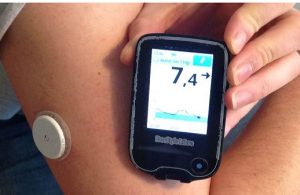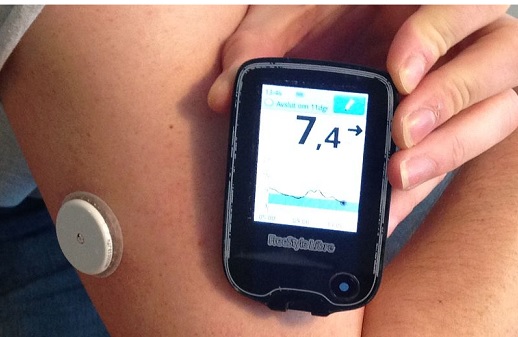by James R. Campbell
How many times in one’s life does a person come up with an idea for a product, only to find themselves at a loss as to what the next step should be?
I suspect that the answer may be more often than we know. I am certain that any of us would not be able to count the number of ideas that we have had for useful goods and services, only to forget them or put them on the back burner for any number of reasons.

Such has been the case with me for the last two years. While I was in the hospital recovering from my accident, I had little to do but think. One of the more positive things that I thought about was inspired by the work of the CNAs, (certified nursing assistants) who worked at the hospital. Among other tasks, these workers are responsible for taking a patient’s vital signs: blood pressure, oxygen level, and body temperature. These visits, while short, were enjoyable, if for no other reason than the fact that there was another person in the room, if only for a brief time. Dear came to the hospital every day, but she left at night. I was alone, devoid of companionship except for the cable TV, which was limited to extended basic service.
My circumstances gave me a lot of time to ponder. As I paid attention to the CNAs as they went about their work, I couldn’t help but wonder why they didn’t have talking thermometers and other assistive devices for the blind patients.
Maybe there are so few of us in any community that the hospital districts don’t think that it would be worth the money that they would spend for the items. A talking glucometer costs $50.00, but then there is the cost of the supplies to go with it. The talking thermometer cost roughly $18.00, a talking blood pressure kit costs $95.00. But again, from the hospital’s perspective, how many people would use it? Would the number of blind patients justify the cost.
From a personal perspective, I believe every hospital would benefit from this equipment. If the CNA uses it for one patient, so much the better, that patient no longer needs the CNA to read to information to him or her.
During my stay, I became familiar with two pieces of equipment the hospital had. One is the spirometer, a device that consists of two chambers with a bridge in the middle. A plastic tube is attached, when the patient inserts the mouthpiece and inhales, the force of inhalation moves a series of balls inside the unit up a numbered grid. The greater the force of inhalation, the further the balls move up the grid. The idea is to increase lung strength. To my knowledge, there are no talking spirometers. Another gadget I am familiar with is the pulse oximeter, which measures the oxygen in a person’s blood. The CNA places the unit on a patient’s finger in order to get a reading. It looks like a clamp, attached to a wire of then tube. The CNA or nurse can determine whether a patient needs supplemental oxygen.
The question becomes one of reasonable accommodation. How does a patient get this information without sighted help? I guess that when a blind person is exposed to this equipment for any length of time, these issues become pertinent.
How does a person with limited resources get these things on the market, or even in to consideration for development. The technology is there; it is a matter of the cost of research and development, and then the marketing of the equipment once it has been patented and tested.
I have no doubt that this equipment would be of the greatest benefit to the blind patients who find themselves in the care of the nurses and CNAs for whatever reason. As much as we may hope that we won’t need it, the truth is, we can never be sure. I never thought that I would need it, just as surely as I never dreamed that I would endure a one-month hospital stay, let alone the numerous surgeries that I have had since. Anything can happen, in the blink of an eye. I can only hope that there will be a day when this equipment will be available when it is needed by the next blind patient.
About the Author
James R. Campbell, 61, is poet and writer living with total blindness. He has a Bachelor’s in psychology. He has written articles for the Matilda Ziegler Magazine and Consumervision. A a member of Behind our Eyes, Campbell has three poem collections on CD. They can be downloaded at Recordinglibrary.org. In his free time, he likes cooking, playing harmonica, reptiles, and keeping up with current events.



